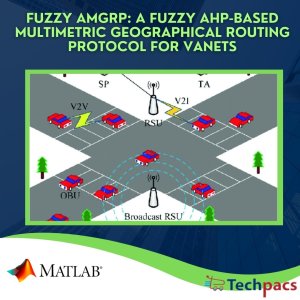Differential Evolution-Based Optimization for Enhanced Communication in MANETs
Problem Definition
Ad hoc networks, characterized by their lack of fixed infrastructure and mobile nodes, pose significant challenges in terms of routing efficiency. The traditional approach of using fuzzy logic in EFMMRP to calculate path trust based on energy, delay, and bandwidth parameters has shown limitations in achieving desired outcomes. The use of a Fuzzy Inference System for path evaluation further complicates the process. To address these shortcomings, there is a need to expand the parameters for path evaluation while also optimizing the algorithm to simplify rule formation within the FIS framework. One potential solution proposed is the development of a Differential Evolutionary algorithm tailored for MANET, taking into account factors such as Packet Delivery Ratio, Control overhead, and Packet Delivery Delay to assess the efficacy of the DEMMRP technique.
By addressing these key limitations and pain points, there is an opportunity to enhance the efficiency and performance of ad hoc networks.
Objective
The objective of the proposed work is to address the limitations of traditional fuzzy logic-based methods for routing in ad hoc networks by introducing a Differential Evolutionary algorithm tailored for MANET. By considering additional parameters such as Energy, Delay, Bandwidth, Packet Count, and Hop Count, the aim is to enhance Packet Delivery Ratio (PDR), Control overhead, and Packet Delivery Delay (PDD) in order to improve overall network performance. The proposed DEMMRP technique involves utilizing the DE algorithm for rule formation and performance optimization, as well as integrating a mobility model and HELLO packets for node selection and data forwarding. The ultimate goal is to optimize the routing protocol and improve communication efficiency in mobile ad hoc networks, while addressing uncertainties and enhancing reliability through a comprehensive evaluation of key metrics.
Proposed Work
Wireless ad hoc networks are known for their self-organizational capabilities and lack of fixed infrastructure, making routing a challenging task due to the mobile nature of nodes. Traditional methods like EFMMRP based on fuzzy logic for path trust evaluation have shown limitations in terms of efficiency. To address these shortcomings, a new approach utilizing Differential Evolutionary algorithm for MANET is proposed. This approach aims to enhance Packet Delivery Ratio (PDR), Control overhead, and Packet Delivery Delay (PDD) by considering additional parameters such as Energy, Delay, Bandwidth, Packet Count, and Hop Count. These parameters play a crucial role in improving the overall network performance by maximizing energy utilization, minimizing delay, increasing bandwidth capacity, and optimizing packet transmission efficiency.
Differential Evolution (DE) algorithm is chosen as an optimization technique to replace the traditional Fuzzy Inference System (FIS) due to its enhanced efficiency in rule formation and performance optimization.
The proposed DEMMRP technique involves transmitting HELLO packets to evaluate the PDR of individual nodes, selecting the node with the highest PDR as the data forwarder node, and ultimately enhancing the overall network PDR. By integrating the mobility model for source and destination node selection and applying the DE algorithm to the routing protocol, the objective is to achieve improved communication efficiency and network performance in ad hoc networks. As uncertainties in mobile ad hoc networks continue to pose challenges, the proposed work aims to provide a reliable and efficient solution by optimizing the routing protocol and considering a comprehensive set of parameters to address the limitations of traditional fuzzy systems. Through the DEMMRP technique, the goal is to enhance the reliability, efficiency, and overall performance of the network by optimizing the path selection process and improving key metrics such as PDR, PDD, and control overhead.
Application Area for Industry
This project can be beneficial in various industrial sectors such as telecommunications, defense, transportation, and emergency response. In the telecommunications sector, the proposed solutions can improve the efficiency and reliability of communication networks by optimizing parameters like energy, delay, bandwidth, packet count, and hop count. This can result in enhanced network performance, increased data transmission capacity, and extended network lifetime due to efficient energy usage. In the defense sector, the project can help in establishing secure and robust communication networks in dynamic battlefield environments. By using the Differential Evolutionary algorithm, the network can adapt to changing conditions and prioritize data transmission based on PDR, reducing control overhead and packet delivery delay.
Furthermore, in transportation and emergency response industries, the project's solutions can lead to more reliable and responsive communication networks for real-time data exchange and decision-making. By considering parameters like energy efficiency and minimum delay, the proposed work can enable efficient routing of information, ensuring timely delivery of critical data. Overall, the implementation of these solutions can address the challenges faced by industries in managing ad hoc networks, leading to improved overall performance, increased network reliability, and optimized resource utilization.
Application Area for Academics
The proposed project on enhancing the efficiency of routing in Mobile Ad hoc Networks (MANET) through the use of the Differential Evolutionary algorithm can significantly enrich academic research, education, and training in the field of network optimization and wireless communication.
By incorporating additional parameters such as Energy, Delay, Bandwidth, Packet Count, and Hop Count in the evaluation of path trust, the project aims to provide a more comprehensive and reliable solution compared to the traditional fuzzy logic-based approach. This expanded set of parameters not only improves the overall performance of the network in terms of Packet Delivery Ratio (PDR), Packet Delivery Delay (PDD), and control overhead but also extends the network lifetime and enhances data transmission efficiency.
The use of the Differential Evolutionary (DE) optimization algorithm in place of the Fuzzy Inference System (FIS) offers researchers, MTech students, and PhD scholars a valuable opportunity to explore innovative research methods and simulation techniques in the field of network optimization. By leveraging DE's capabilities in handling complex optimization problems, users can gain insights into advanced algorithm design and performance evaluation.
Moreover, the project's focus on optimizing the performance metrics of MANETs through the DEMMRP technique opens up avenues for further research in network routing protocols, evolutionary algorithms, and wireless communication systems. The code and literature generated from this project can serve as a valuable resource for conducting experiments, developing new algorithms, and analyzing network data in educational settings.
In the future, this project has the potential to be extended to include more sophisticated optimization techniques, integration with emerging technologies such as Internet of Things (IoT) devices, and real-world deployment scenarios. By continuously exploring and refining the proposed algorithm, researchers and students can contribute to the advancement of network optimization methods and enhance the reliability and efficiency of wireless communication systems.
Algorithms Used
The Differential Evolution algorithm is utilized in the proposed work to enhance the performance of wireless nodes in ad hoc networks. This algorithm aims to optimize parameters such as energy consumption, delay, bandwidth, packet count, and hop count in order to improve the network's Packet Delivery Ratio (PDR), Packet Delay Distribution (PDD), and control overhead. By replacing the traditional Fuzzy Inference System (FIS) with the Differential Evolutionary (DE) optimization algorithm, the proposed DEMMRP technique effectively selects data forwarder nodes based on PDR evaluations, resulting in a more efficient and reliable network operation. The DE algorithm is chosen for its superior optimization capabilities compared to traditional techniques, making it a suitable choice for addressing the complexities of optimizing multiple parameters in wireless ad hoc networks.
Keywords
SEO-optimized keywords: ad hoc networks, self-ruling networks, mobile nodes, MANET, routing, EFMMRP, fuzzy logic, path trust, energy, delay, bandwidth, fuzzy inference system, differential evolutionary algorithm, wireless nodes, arbitrary topologies, uncertainties, PDR, PDD, control overhead, energy efficiency, network lifetime, minimum delay, multimedia transmission, bandwidth capacity, packet count, hop count, optimization algorithm, wireless communication, network performance evaluation, quality of service, resource allocation, network throughput, network latency, optimization techniques, network parameters, network optimization, performance enhancement, DEMMRP, HELLO packets, data forwarder node, overall PDR enhancement.
SEO Tags
ad hoc networks, self-ruling networks, mobile nodes, MANET, routing, EFMMRP, fuzzy logic, path trust, energy, delay, bandwidth, Fuzzy Inference system, Differential Evolutionary algorithm, PDR, Packet Delivery Ratio, Control overhead, PDD, Packet Delivery Delay, wireless nodes, self-organizable, uncertainties, fuzzy system, PDR, PDD, control overhead, Energy, Battery power, Delay, Routes, Bandwidth, Packet Count, Hop Count, Differential Evolutionary, optimization algorithm, network lifetime, multimedia transmission, data framing, packet transmission, hop count, DE optimization algorithm, DEMMRP, HELLO packets, data forwarder node, network performance optimization, parameter optimization, algorithm enhancement, network optimization, wireless communication, optimization techniques, network parameters, network performance evaluation, quality of service, resource allocation, network throughput, network latency, optimization algorithms, wireless network management.
| Shipping Cost |
|
No reviews found!

















































No comments found for this product. Be the first to comment!